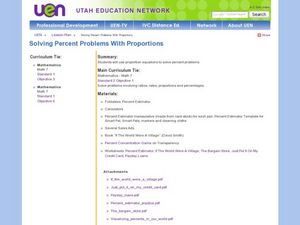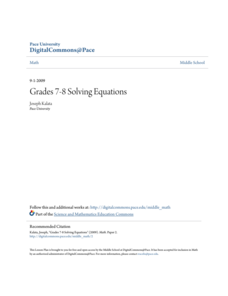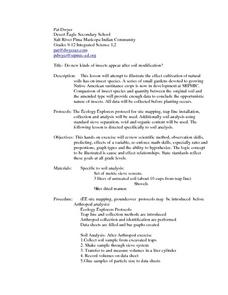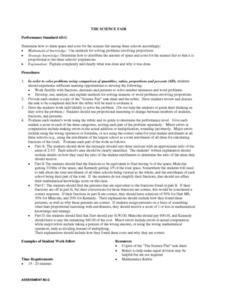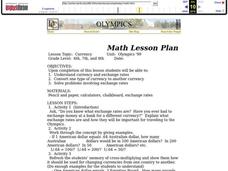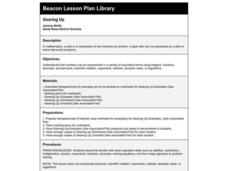Curated OER
Solving Percent Problems with Proportions
Seventh graders explore the concept of percent problems. In this percent problem lesson, 7th graders use proportion equations to solve percent problems. Students find percentages of numbers and use proportions to determine percents in...
Beacon Learning Center
Bowling Over the Order of Operations
Upper graders will solve equations using order of operations, and create equations that to play a fun math bowling game. They will bowl using dice to practice operations. Extensions are also included.
Pace University
Grades 7-8 Solving Equations
Create a similar blueprint. The differentiated lesson has pupils work in teams to create a brochure, scale model, or blueprint of a selected house with some minor changes. Once finished, team members present their final projects to the...
Curated OER
Do new kinds of insects appear after soil modification?
Students explore and experiment with the concept do new kinds of insects appear after soil modification. They assess and review scientific methods of observation, predicting, variables, math skills, ratio, proportions, graphs and the art...
Curated OER
Science Fair Space
Students determine the most equitable way to share space and cost between three schools for a fictional science fair. Given a diagram, a word problem, and a data set, students analyze and explain the best way for all schools to share...
Curated OER
Understanding Radios
Fifth graders explore ratios. Using models and real-world scenarios, they complete tables and generate comparisons. Pupils demonstrate multiple ways of writing ratios and describe the differences between ratios.
Curated OER
Gears and Proportions
Students explore gears. In this simple machines and ratio instructional activity, students view a video clip in which front and rear bicycle gears are explained. From a set of gear combinations and gear ratios, students identify...
Curated OER
Baseball Proportion
Students work on different mathematical skills that align with state standards. The skill of problem solving is done with reasoning and communication is made to students through solid brain connections to the math concepts.
Illinois State Board of Education
Solar System
Aspiring astronomers solve problems involving mixed units of the same attribute, including time, money, length, and area. They convert large numbers into scientific notation, then compute and compare ratios to explain why drawing...
Curated OER
A Recipe For Success
Sixth graders explore a relevant application of ratios and proportions. They apply this concept through guided practice and interactive feedback.
Curated OER
Currency Exchange
Students investigate the currency exchange rate. In this middle school mathematics lesson, student use proportions to exchange between the U.S. dollar and the euro. Students come up with a product they would like to buy and...
Curated OER
Punch Mix-up
Fifth graders discuss the relationship between equivalent fractions, ratios, and proportions. In this fraction lesson, 5th graders answer questions about a punch mixture in order to find the ratio of ingredients.
Curated OER
Recipe: Unit Rate
Young scholars solve problems using ratios and proportions. In this algebra lesson, students identify the unit rate and convert between fractions and decimals. They create graphs from their data.
Curated OER
Currency
Students investigate currency and exchange rates. In the middle school mathematics lesson, students use ratio and proportion to convert from one type of currency to another. Students solve problems involving currency exchange.
Curated OER
History of Our Solar System Time Line
Ninth graders explore the concept of ratios. In this ratio lesson, 9th graders construct a to scale time line that starts at the beginning of time. Students determine the correct placement of big events in time such as when the dinosaurs...
Willow Tree
Direct and Inverse Variations
Enhance pupil understanding of proportions and variable relationships by studying direct and inverse variation. Use the idea of a proportional relationship to teach direct variation. Then use a similar pattern to help individuals...
Curated OER
How Big is Barbie?
Students measure various dimensions of a male and a female dolls body and scale them proportionally to average human measurements. They calculate the appropriate scale factor (magnitude) to enlarge their doll and apply that scale factor...
PBS
Frame Yourself: Area and Perimeter
Elementary schoolers are arranged in pairs and view the video Math Works: Measurement: The Difference Between Perimeter and Area. They discuss any prior knowledge they have of the term perimeter and then brainstorm together what the...
Curated OER
Data Analysis and Probability: Graphing Candy with Excel
Collect and graph data using Microsoft Excel with your math class. They will make predictions about the number of each colored candy in a bag of M&M's, then sort, classify, count, and record the actual data before using Excel to...
EngageNY
Percent of a Quantity
Visualize methods of finding percents. Classmates find a percent of a quantity using two methods including a visual model in the 26th lesson in a series of 29. By the end of the lesson, scholars find percents given a part and the whole...
Illustrative Mathematics
Buying Gas
A quick problem to test your middle schoolers' knowledge of dividing with decimals. Also a good practice of unit rates, they must compute the cost of one gallon of gas when given the total amount for a fill up. Can be used as a preface...
Willow Tree
Dimensional Analysis
Convey to your pupils the importance of units, then show how to use dimensional analysis to perform a unit conversion. The math lesson includes detailed worked-out solutions to guide learners in their practice.
Mathalicious
New-tritional Info
Burning off a Big Mac® doesn't seem like a big feat until you calculate the minutes of exercise necessary to break even. Young mathematicians look at different menu items in relation to different body weights and exercises to calculate...
